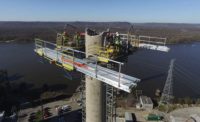Owners, contractors, subcontractors and architects are largely working together to address cost overruns, schedule delays and other problems related to the COVID-19 pandemic on jobsites, according to a panel of lawyers and related construction leaders during a webinar by the American Bar Association’s Forum on Construction.
The Aug. 6 session was a wrap-up of 11 previous COVID-related webinars the forum began holding on April 7. It will continue the free series on Sept. 15. Panelists from previous webinars revisited topics discussed in the series, including dispute resolution, force majeure, workforce challenges and builders’ risk.
“I think we know a lot more since April 7,” when the first webinar was held, says Michael T. Kamprath, assistant general counsel for the Hillsborough County, Fla. Aviation Authority. “Things have kind of settled down into a familiar pattern.”
The new normal, however, is proving to be costly.
“Contractors have really been hurt by additional costs,” says Frank Giunta, president of HKA Americas. “Contractors' efficiencies have gone down dramatically. Social distancing has had an impact. Everyone is trying to figure out how to get projects across the finish line in a cost-effective manner.”
Doing so requires cooperation, which has been occurring, says Rhonda Caviedes, senior corporate counsel for Jacobs. So far, she says, “parties have been willing to work together.”
Tracy Steedman of Adelburg Rudow said panelists during her May 12 webinar were hopeful the virus would lead to more collaboration among owners, contractors, subcontractors and the entire project team. “In 99% of the projects, that has actually happened. Everyone is willing to accept a piece of the damages, as opposed to pointing fingers,” she said on Aug. 6.
Chris Beirise, co-lead of HKA’s construction practice, said communication, cooperation and teamwork are key. “We are all trying to work together, even though contracts limit some of those recoveries,” he says. He advises clients to “think in terms of what’s best for the project. You always should be meeting together to resolve issues before they become a big giant mess and a fight.”
Still, there are some sticking points, including contractors or subcontractors lumping additional costs into a larger COVID-19 “bucket,” says Kamprath. “But when we go dig and look under the hood, those impacts aren’t really there. I just want to caution: Don’t make those sorts of claims, they can turn into false claims very quickly and they can really erode the trust on the project.”
Similar claims are being made by individuals who say they can’t work because of COVID. “But they didn’t really have it,” he says. Giunta says some COVID-related wrongful death suits are being filed against owners and contractors, “So I think we’re in for a bit of a rocky road ahead. We’re all trying to protect our employees the best we can.”
So far, surety claims haven’t spiked, says Doug Wills, Chubb vice president and surety claims manager, but he added, “we are anticipating more claims.”
Willis and others say there are going to be liquidity issues related to the COVID-related costs, possibly for several years to come.
“There are going to be some very long-term impacts across the board because of this disease,” says Kamprath. He says the aviation authority has delayed or canceled $905 million worth of projects over the next four years “The timing of when those projects get built, if ever, is really up in the air,” he says.
Kristine Kubes, of the Kubes Law Office and chair of the Forum on Construction, said everyone in the industry must be willing to adapt.
“The rigid person is going to be crushed through this. The rigid corporation, the rigid small company, is going to be crushed through this,” she says. “We have to be flexible and we have to redefine to do what we do.”




